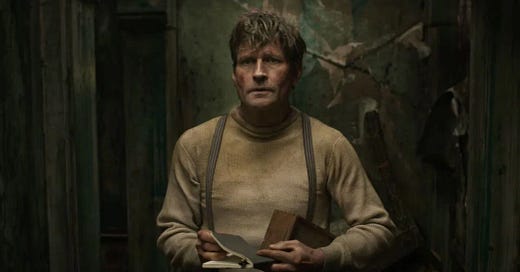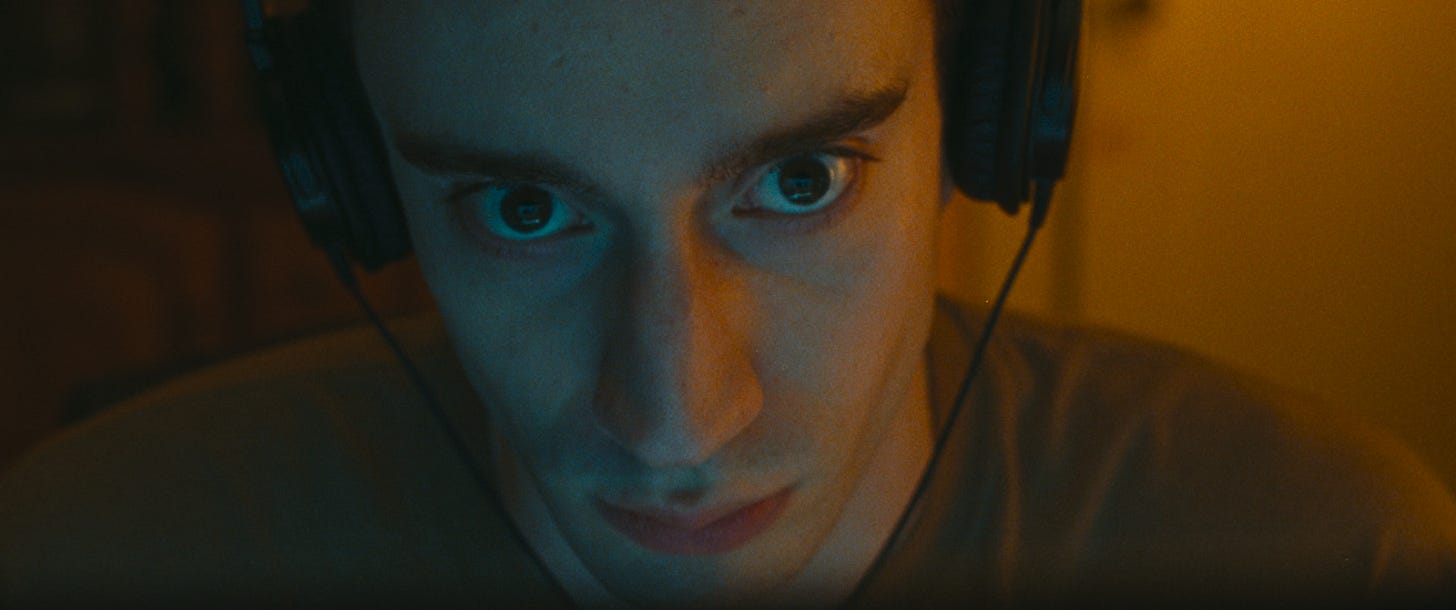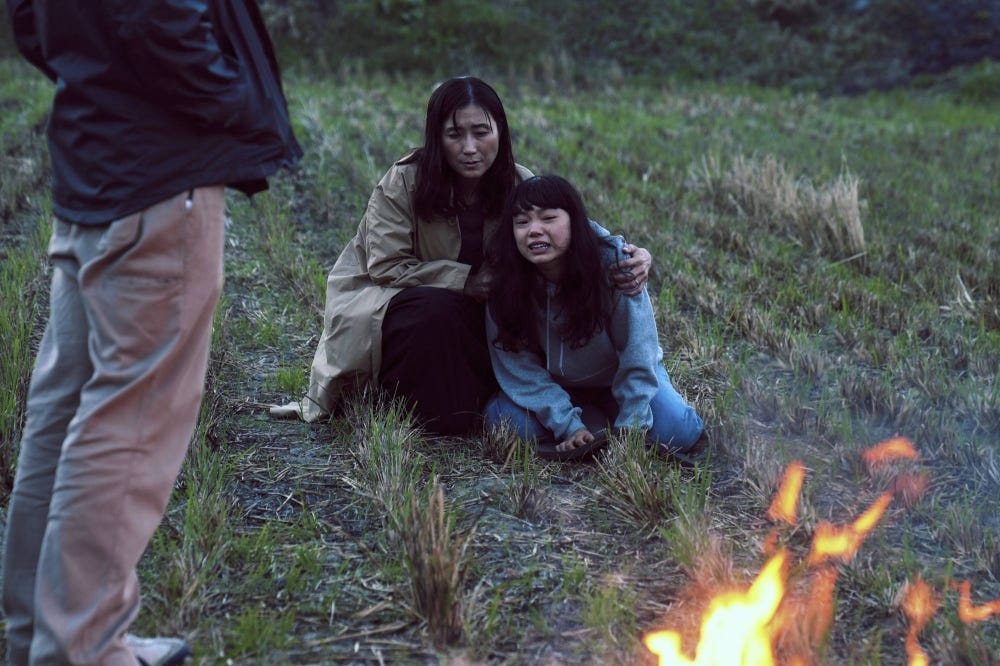'Best Wishes' From a 'Lurker' Having 'Strange Days' At CCFF
Day 1 (continued) and Day 2 of the Chicago Critics Film Festival. [5/5/2025]
After my first movie’s screening made me excited about watching movies in the theater again (even knowing I’d have to navigate Chicago’s small intestine, the Red Line, in post-midnight hours to get back from it), I entered the rest of the festival with an open heart, making connections and having after-film discussions in the Music Box Lounge that prompted some of my thoughts. The second day was a huge blast after my brief interview with Dylan O’Brien and James Sweeney for their film Twinless (which I will review at a later date, stay tuned). If this quality keeps up I’m going to fall majorly behind on my reviews, which have kind of become thought dumping grounds under the excess of so much greatness to parse. Let’s get into it!
Lurker (thriller)
After being courted by the charms of the festival’s first film, I was ready to settle into the typical genre fare that adds necessary but fluffy texture to the festival’s headliners. What I got instead was one of the best films of the festival.
Lurker is a fable of the modern age, populated with archetypes plucked from it. Its story follows a chronically online loner in his twenties who seeks out attention just to feel like he matters. He even lives with his Grandma for good measure. With much difficulty he navigates the inner social circle of Oliver, a rising star in the music world working for the love daddy never provided. This creeping, dark infiltration changes the ecosystem around built around Oliver’s talent forever.
You've heard this story before, but the crystallized focus on the overlap between that loner and that posse is what makes Lurker worth seeing. That new annoyingly necessary documentary on Netflix about the surely self-evident "Dark Side of Kidfluencing" recently dug into this phenomenon of celebrity. Nobody wants to be on the outside of the winning lottery ticket, no matter how much abuse they sustain. Yet Lurker adds a new twist to this dynamic. Without spoiling the second half of the film it's difficult to speak to one large twist the film's second half takes in which a perspective shift and unique take on the lurker/artist relationship stops the film from being generic, so let me simply say the film is worth watching down to the last twist.
Rating: 4/5
Best Wishes to All (J-horror)
Occasionally, I see a film that is difficult to write about, not because it's particularly dull or complex, but because its premise is what it has going for it. To spoil it is to take away a key choice, but to talk around it feels like a trailer or poster. Best Wishes to All is one such movie, which, combined with its lack of technical craft to praise or completely dismiss, leaves me at a bit of a loss.
But I shall do my best. Best Wishes to All is a Japanese horror picture about a young woman’s visit to her grandparents’ country house. Her strange relatives act abruptly, ignoring the bumping noises from a room in the house. After a few odd encounters, she discovers that some horror exists below every family’s happy faces.
The fascinating approach of making this horror a discovery of societal norms brings many readings to mind. Artist Jeff Thiede, with whom I discussed the film afterwards, embraced the fear as expectations of a family unit that makes you live by their rules. My take was broader than that; I believe the filmmaker wishes to explore the fear and guilt of how society works. The young person who realizes their country is built on blood, enslavement, natural pillaging, or whatever evil that builds a nation, a state, a town, or a household. Best Wishes tortures its protagonist further by first realizing that she is expected to carry on this evil for her life to continue its function, then making it a natural law rather than simply one that society deems necessary. "I don't want to live in this world," our protagonist mourns, as if she knows her creator is a filmmaker who placed her there.
Unfortunately, the film exists better as a premise than in its execution. The acting is false and bland, the characters basic, and even in the theater environment, only made one eye-closing moment worthwhile, outside of which the movie played to cold silence. The screenplay is nothing but a great idea for a dismal world, much better directed in a movie like Jordan Peele’s Us. There are some moments of beauty to its compositions, but without an original voice to hang it on, leaving audiences feeling quite dry after what should be such a philosophical feature.
2.5/5
Strange Days (1996) (sci-fi neo-noir)
I can’t get too much into this as I’ll be writing a fuller piece about this film for Starburst Magazine, so let me get personal here in a way I cannot there. Strange Days is one of my top 100 favorite films of all time. For about a year, my voicemail was a recreation of Lenny's in this movie, to the creeped-out annoyance of most who called me. I love its portrait of a future so dark that it just might be true. I love its central technology, the SQID, a VR experience pumped up to a million. And when I saw it this week, I cried at how much I saw of myself in the neo-noir action thriller in the far-off future of 1999. Lenny lying in his apartment, replaying memories over and over again to keep her love alive without her having to be there, was too real. Angela Bassett killing cops was so cool.
4.5/5
Mr. K (Kafkaesque experimental)
When you settle in for a midnight screening at a film festival, you're looking to see something you've never seen before, something that will drive your imagination wild. This film does not disappoint; you're unlikely to have seen a movie like Mr. K before, but if you have been following the work of Crispin Glover or are interested in work deemed Kafkaesque, then you have a pretty good idea of how non-literal works like this can get. Glover, who most remember as George McFly in Back to the Future, plays a young magician simply named Mr. K. The film begins by characterizing humanity as many balls of light separated by black space. "We're all alone," Mr. K narrates as his impossible magic tricks fail to capture the attention of a single member of his audience. "Or maybe it's all just me." Oh yeah, that's the good stuff.
Mr. K then checks into a hotel. He will spend the rest of the movie trying to check out, weaving through a labyrinth of absurd characters and situations. This is Wonderland, and not in that way where someone steps into another world in any piece of media, and a critic calls it Wonderland. Not to bash A Minecraft Movie yet again, but this isn't the Overworld. The hotel in Mr. K embodies Lewis Carroll-level absurdism and nonsense. If you are willing to give in to the looking glass, then Mr. K has many delights, even if its anticapitalist message is pretty obvious. I highly recommend a loopy screening in a theater; there aren't many better ways you can spend a spare surreal moment in the off hours of your life.








